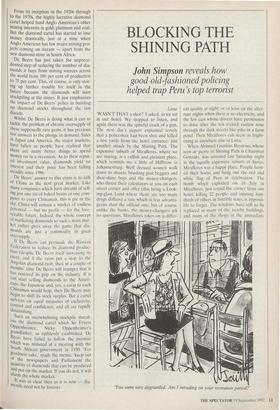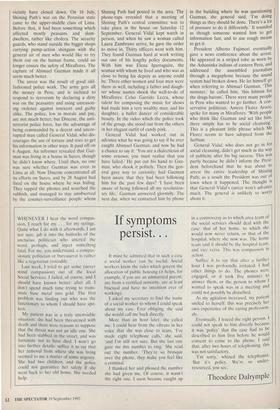BLOCKING THE SHINING PATH
John Simpson reveals how good old-fashioned policing helped trap Peru's top terrorist
Limo 'WASN'T THAT a shot?' I asked, as we sat in our hotel. We stopped to listen, and again there was the spiteful crack of a gun. The next day's papers explained tersely that a policeman had been shot and killed a few yards from the hotel entrance: just another attack by the Shining Path. The expensive suburb of Miraflores, where we are staying, is a raffish and pleasant place, which reminds me a little of Hillbrow in Johannesburg. Well dressed women walk down its streets, brushing past beggars and shoe-shine boys and the money-changers, who thrust their calculators at you on each street corner and offer (this being a Look- ing-glass Land where there are too many drugs dollars) a rate which is less advanta- geous than the official one; but of course, unlike the banks, the money-changers ask no questions. Miraflores takes on a differ-
ent quality at night: or at least on the alter- nate nights when there is no electricity, and the few cars whose drivers have permission to drive after the ten o'clock curfew nose through the dark streets like pike in a farm pond. Then Miraflores can seem as fright- ening as anywhere else in Lima.
When Ahimael Guzman Reynoso, whose nom de perm in Shining Path is Chairman Gonzalo, was arrested last Saturday night in the equally expensive suburb of Surco. Miraflores was a happy place. People hoot- ed their horns and hung out the red and white flag of Peru in celebration. The bomb which exploded on 16 July in Miraflores. just round the corner from our hotel, killing 22 people and injuring hun- dreds of others in horrible ways, is impossi- ble to forget. The windows have still to he replaced in many of the nearby buildings, and many of the shops in the immediate
You seem very disgruntled. Am I intruding on your recreation period?' vicinity have closed down. On 16 July, Shining Path's war on the Peruvian state came to the upper-middle class of Lima. Before that, it had been something which affected mostly peasants and slum- dwellers, rather like cholera. The security guards, who stand outside the bigger shops carrying pump-action shotguns with the general air of men who would like to try them out on the human frame, could no longer ensure the safety of Miraflores. The capture of Abimael Guzman made it all seem much better.
The arrest was the result of good old- fashioned police work. The army gets all the money in Peru, and is inclined to respond to terrorism by declaring a dirty war on the peasantry and using unreason- ing violence against innocent and guilty alike. The police, low in morale and pay, are not much better; but Dincote, the anti- terrorist police force, has the advantage of being commanded by a decent and uncor- rupted man called General Vidal, who dis- courages the use of torture and tries to get his information in other ways. It paid off on 6 August. An informer revealed that Guz- man was living in a house in Surco, though he didn't know where. Until then, no one was sure whether Guzman was even in Lima at all. Now Dincote concentrated all its efforts on Surco, and by 28 August had fixed on the house where he was hiding. They tapped the phones and searched the rubbish, and managed to stay unobserved by the counter-surveillance people whom Shining Path had posted in the area. The phone-taps revealed that a meeting of Shining Path's central committee was to take place in the house on Saturday 12 September. General Vidal kept watch in person, and when he saw a woman called Laura Zambrano arrive, he gave the order to move in. Thirty officers went with him. They found Guzman hard at work writing out one of his lengthy policy documents. With him was Elena Iparraguire, the woman with whom he lived and who was as close to being his deputy as anyone could be. Three other women and four men were there as well, including a father and daugh- ter whose names shook the well-to-do of Miraflores: Celso Garrido Lecca, whose talent for composing the music for shows had made him a very wealthy man, and his daughter, a ballet dancer of considerable beauty. In the video which the police took of the group, she stood out from the others in her elegant outfit of candy pink.
General Vidal had worked out in advance what he was going to say if he ever caught Abimael Guzman, and now he had a chance to say it: 'You are a dialectician of some renown; you must realise that you have failed.' He put out his hand to Guz- man, who shook it politely. Then the gen- eral gave way to curiosity; had Guzman been aware that they had been following him for the past few days? 'I have been aware of being followed all my revolution- ary life,' Guzman answered gloomily. The next day, when we contacted him by phone in the building where he was questioning Guzman, the general said, 'I'm doing things as they should be done. There's a lot of pressure to do it differently.' It sounded as though someone wanted him to get information fast, and to use rough means to get it. President Alberto Fujimori eventually gave a news conference about the arrest. He appeared in a striped robe as worn by the Ashaninka indians of eastern Peru, and addressed the assembled journalists through a megaphone because the sound system had broken down. He let himself go when referring to Abimael Guzman. 'This monster,' he called him, 'this hitman for the drugs barons'. There were many people in Peru who wanted to go further. A con- servative politician, Antero Florez Araoz, spoke for many in Miraflores: 'With people who think like Guzman and act like him, there simply has to be social cleansing. This is a pleasant little phrase which Mr Florez seems to have adopted from the Serbian.
General Vidal, who does not go in for social cleansing, didn't get much in the waY of publicity after his big success. This was partly because he didn't inform the Presi- dent beforehand that he was about to arrest the entire leadership of Shining Path; as a result the President was out of town when it happened. The thought Is that General Vidal's career won't advance much. The general is unlikely to worry about it.



























































 Previous page
Previous page